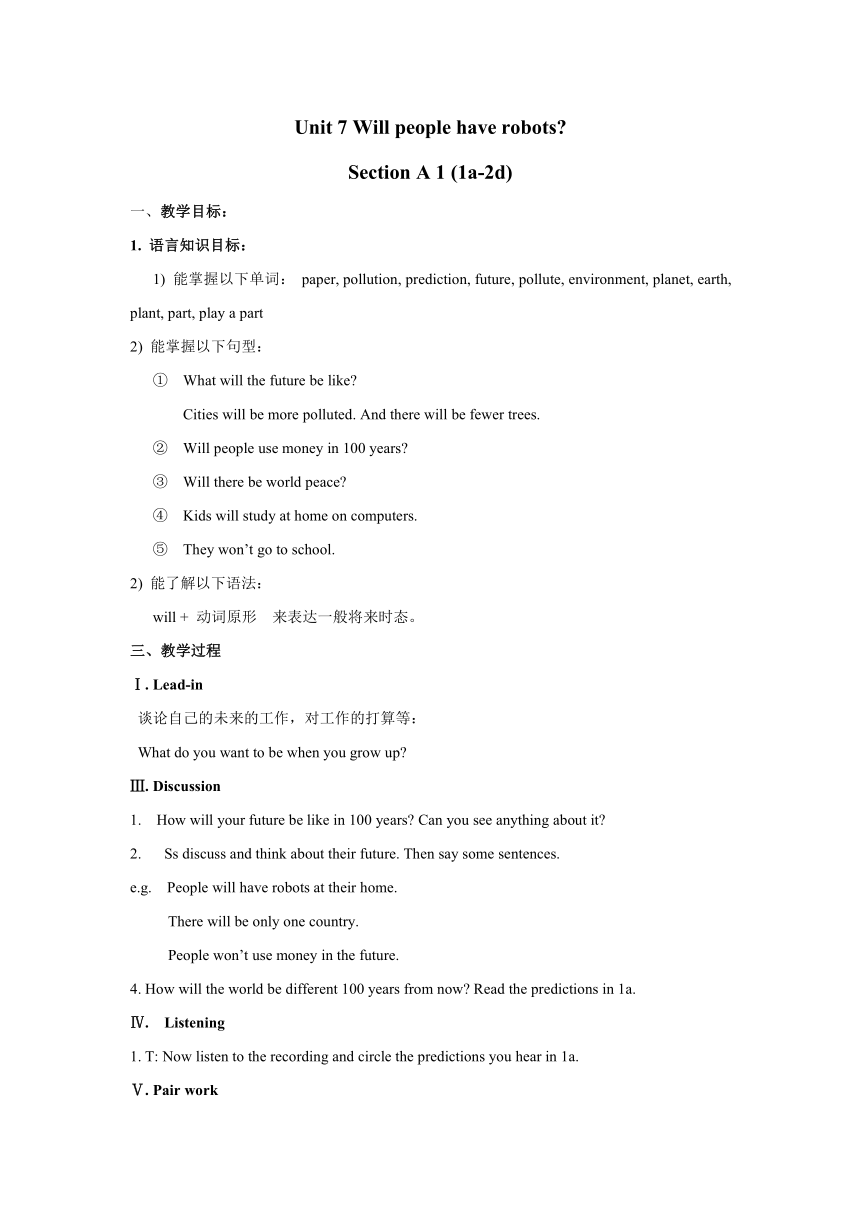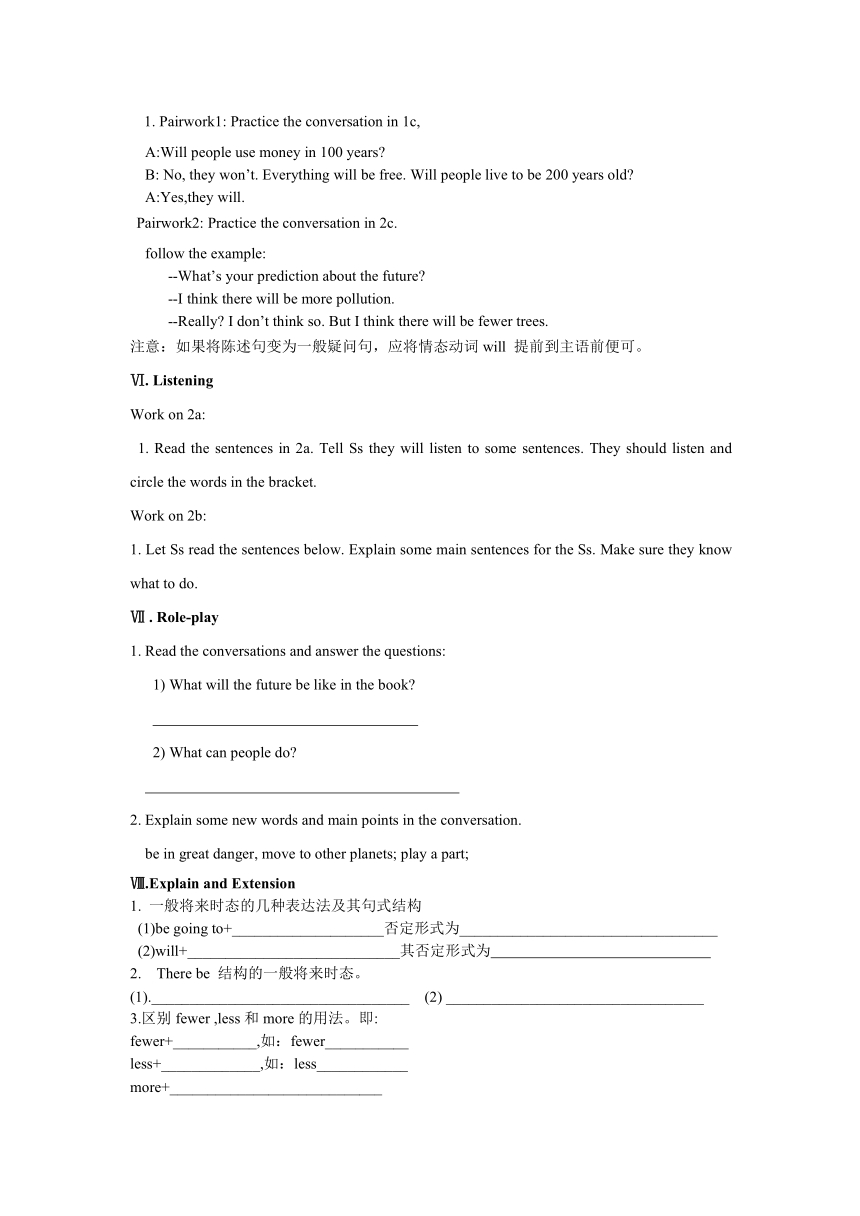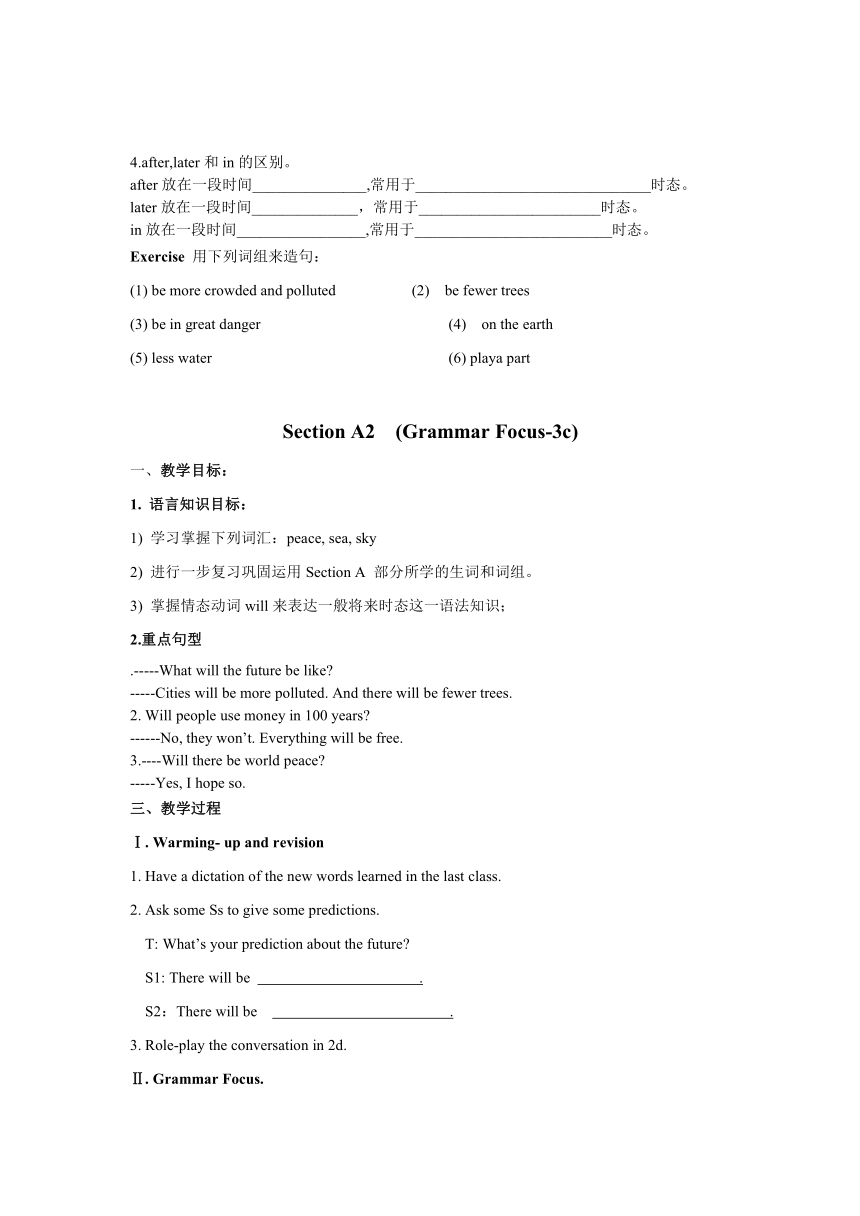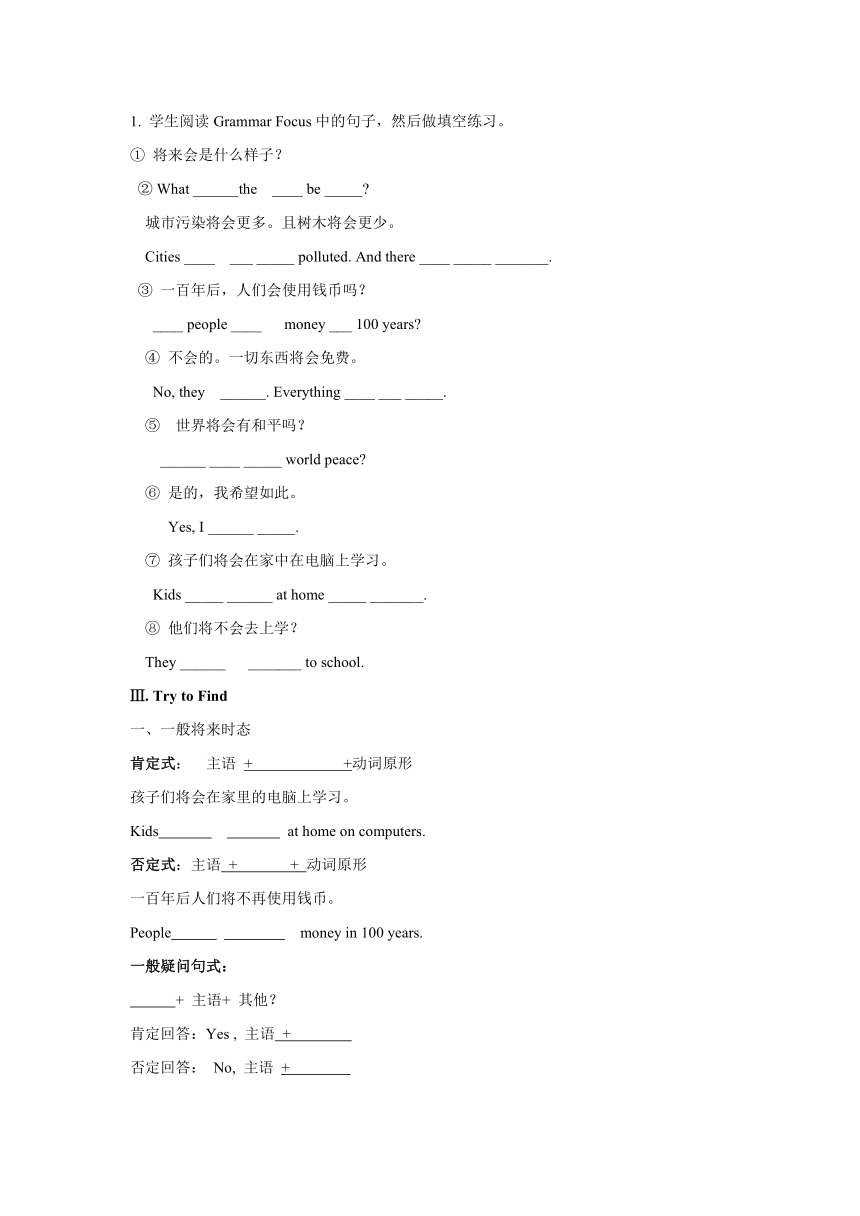Unit 7 Will people have robots ? 单元学案(4课时)
文档属性
| 名称 | Unit 7 Will people have robots ? 单元学案(4课时) |

|
|
| 格式 | zip | ||
| 文件大小 | 20.9KB | ||
| 资源类型 | 教案 | ||
| 版本资源 | 人教新目标(Go for it)版 | ||
| 科目 | 英语 | ||
| 更新时间 | 2015-05-23 00:00:00 | ||
图片预览




文档简介
Unit 7 Will people have robots
Section A 1 (1a-2d)
一、教学目标:
1. 语言知识目标:
1) 能掌握以下单词: paper, p ( http: / / www.21cnjy.com )ollution, prediction, future, pollute, environment, planet, earth, plant, part, play a part
2) 能掌握以下句型:
① What will the future be like
Cities will be more polluted. And there will be fewer trees.
② Will people use money in 100 years
③ Will there be world peace
④ Kids will study at home on computers.
⑤ They won’t go to school.
2) 能了解以下语法:
will + 动词原形 来表达一般将来时态。
三、教学过程
Ⅰ. Lead-in
谈论自己的未来的工作,对工作的打算等:
What do you want to be when you grow up
Ⅲ. Discussion
1. How will your fut ( http: / / www.21cnjy.com )ure be like in 100 years Can you see anything about it
2. Ss discuss and t ( http: / / www.21cnjy.com )hink about their future. Then say some sentences.
e.g. People will have robots at their home.
There will be only one country.
People won’t use money in the future.
4. How will t ( http: / / www.21cnjy.com )he world be different 100 years from now Read the predictions in 1a.
Ⅳ. Listening
1. T: Now listen to ( http: / / www.21cnjy.com ) the recording and circle the predictions you hear in 1a.
Ⅴ. Pair work
1. Pairwork1: Practice the conversation in 1c,
A:Will people use money in 100 years
B: No, they won’t ( http: / / www.21cnjy.com ). Everything will be free. Will people live to be 200 years old
A:Yes,they will.
Pairwork2: Practice the conversation in 2c.
follow the example:
--What’s your prediction about the future
--I think there will be more pollution.
--Really I don’t think so. But I think there will be fewer trees.
注意:如果将陈述句变为一般疑问句,应将情态动词will 提前到主语前便可。
Ⅵ. Listening
Work on 2a:
1. Read the sente ( http: / / www.21cnjy.com )nces in 2a. Tell Ss they will listen to some sentences. They should listen and circle the words in the bracket.
Work on 2b:
1. Let Ss read the sen ( http: / / www.21cnjy.com )tences below. Explain some main sentences for the Ss. Make sure they know what to do.
Ⅶ . Role-play
1. Read the conversations and answer the questions:
1) What will the future be like in the book
2) What can people do
2. Explain some new words and main points in the conversation.
be in great danger, move to other planets; play a part;
Ⅷ.Explain and Extension
1. 一般将来时态的几种表达法及其句式结构
(1)be going t ( http: / / www.21cnjy.com )o+____________________否定形式为__________________________________
(2)will+____________________________其否定形式为
2. There be 结构的一般将来时态。
(1).__________________________________ (2) __________________________________
3.区别fewer ,less和more的用法。即:
fewer+___________,如:fewer___________
less+_____________,如:less____________
more+____________________________
4.after,later和in的区别。
after放在一段时间_______________,常用于_______________________________时态。
later放在一段时间______________,常用于________________________时态。
in放在一段时间_________________,常用于__________________________时态。
Exercise 用下列词组来造句:
(1) be more crowded and polluted (2) be fewer trees
(3) be in great danger (4) on the earth
(5) less water (6) playa part
Section A2 (Grammar Focus-3c)
一、教学目标:
1. 语言知识目标:
1) 学习掌握下列词汇:peace, sea, sky
2) 进行一步复习巩固运用Section A 部分所学的生词和词组。
3) 掌握情态动词will来表达一般将来时态这一语法知识;
2.重点句型
.-----What will the future be like
-----Cities will be more polluted. And there will be fewer trees.
2. Will people use money in 100 years
------No, they won’t. Everything will be free.
3.----Will there be world peace
-----Yes, I hope so.
三、教学过程
Ⅰ. Warming- up and revision
1. Have a dictation of the new words learned in the last class.
2. Ask some Ss to give some predictions.
T: What’s your prediction about the future
S1: There will be .
S2:There will be .
3. Role-play the conversation in 2d.
Ⅱ. Grammar Focus.
1. 学生阅读Grammar Focus中的句子,然后做填空练习。
① 将来会是什么样子?
② What ______the ____ be _____
城市污染将会更多。且树木将会更少。
Cities ____ ___ _____ polluted. And there ____ _____ _______.
③ 一百年后,人们会使用钱币吗?
____ people ____ money ___ 100 years
④ 不会的。一切东西将会免费。
No, they ______. Everything ____ ___ _____.
⑤ 世界将会有和平吗?
______ ____ _____ world peace
⑥ 是的,我希望如此。
Yes, I ______ _____.
⑦ 孩子们将会在家中在电脑上学习。
Kids _____ ______ at home _____ _______.
⑧ 他们将不会去上学?
They ______ _______ to school.
Ⅲ. Try to Find
一、一般将来时态
肯定式: 主语 + +动词原形
孩子们将会在家里的电脑上学习。
Kids at home on computers.
否定式:主语 + + 动词原形
一百年后人们将不再使用钱币。
People money in 100 years.
一般疑问句式:
+ 主语+ 其他?
肯定回答:Yes , 主语 +
否定回答: No, 主语 +
二、There be 句型:
1. there be 句型表示客观存在的“有”(所有者不明确),特别注意不要翻译为“这里有….”。例如:
湖边有很多树。
_____ _______ many trees near the lake.
be 动词有 ______ _______ 两种形式。
2. be 动词形式的确定要根据其后面的名词 单复数形式来确定。
_____ _____ an apple tree in the park.
_____ ______ many people in the park today.
3. There be 句型的一般将来时结构:
肯定式:There + ________ + 其他
否定式: There + ___________ + 其他
一般疑问句:____________ + be + 其他
答语: Yes, there will. / No, there won’t.
Ⅳ. Practice
Work on 3a:
1. Tell Ss to read ( http: / / www.21cnjy.com )the conversation in 3a and try to fill in the blanks with more/ less or fewer.
Work on 3b:
学生们阅读句子的开头,明白每个句子的意思。
Ⅴ. Group work
1. 小组中的同学们对未来的城市进行讨论。
2. 每个成员发表自己的想法,小组长进行记录,并进行汇总。
Ⅵ. Exercises
Section B1 1a-2e
一、教学目标:
1. 语言知识目标:
1) 能掌握以下单词:apartm ( http: / / www.21cnjy.com )ent, rocket, space, space station, even, human, servant, dangerous, already, factory, simple, over and over again, believe, hundreds of, inside, disagree, shape, fall, fall down, look for, possible, impossible
2) 能掌握以下句型:
① —Where do you live? —I live in an apartment.
② There are already robots working in factories.
③ It’s easy for children to wake up and know where they are.
④ That may not seem ( http: / / www.21cnjy.com )possible now, but computers and rockets seemed impossible 100 years ago.
3) 能综合运用will表达一般将来时态。
二、教学过程
Ⅰ. Warming- up and revision
1. Daily greeting.
2. 复习情态动词will 构成的一般将来时态的构成。
3. 复习more, fewer, less 后面所跟名词的情况。
Ⅱ. Lead in
1. Ask Ss some questions:
T: What will you do in the future
T: Where will you live
T: How will you go to work
2. Present new words
apartment, rocket, space, space station, human, servant, factory…
Ⅲ. Discussion
1. Work with your ( http: / / www.21cnjy.com )partners. Think of other words and write them in the chart in 1a.
2. Ss discuss the words and write them in the chart.
Ⅳ. Listening
Work on 1c:
Work on 1d:
Ⅴ. Discussion
1. Work in groups. ( http: / / www.21cnjy.com )Tell your partner what you know about robots. What do they look like and what can they do
Ⅵ. Reading
Questions:
Are you interested in robots
Do you want to have a robot
Read the passage and find out these phrases.
(1) 在工厂 __________ (2) 帮助做某事________
(3) 感到乏味 _________________
(4) 在将来 ______________
(5) 试着做某事___________________
(6) 能够 ________________
(7) 倒塌 _______________
(8) 似乎可能/不可能 _____________
(9) 许多;大量__________
Translate the sentences into Chinese.
(1)Today there are already robots working in factories.
___________________________________________________
(2) It will be difficult to make them really think like a human.
___________________________________________________
(3)They are fun to watch.
___________________________________________________
(4 )However ,they agree it may take hundreds of years.
___________________________________________________
Exercise
Section B2 3a-Self check
一、教学目标:
1. 语言知识目标:
1) 掌握下列生词: probably, during, holiday, word
2) 复习用will表达一般将来时态的用法。结合机器人这一话题表达自己的想法。
3) 能够综合运用所掌握的知识来描述自己未来生活的情况。
二、教学过程
Ⅰ. Warming- up and revision
1. Have a dictation of the new words and expressions.
Ⅱ. Lead in
1. Ask some Ss what their life will be in the future.
T: What will you life be in the future
Ⅲ. Reading
1. Read the art ( http: / / www.21cnjy.com )icle about Jill’s life in the future. Fill in the blanks with the words in the box.
2. 阅读指导:
首先,阅读短文,整体把握短文大意。
其次,分析有空格的每个句子,看空格处的意思,联系所给单词的意思,进行综合分析,确定空格处应填的单词。
Ⅳ. Writing
Work on 3b:
Think about your l ( http: / / www.21cnjy.com )ife 20 years from now. Write down some notes in the chart below.
Work on 3c
Write about your life 20 years from now using the notes in 3b.
Ⅴ. Self check
Work on Self check 1:
Work on Self check 2
Section A 1 (1a-2d)
一、教学目标:
1. 语言知识目标:
1) 能掌握以下单词: paper, p ( http: / / www.21cnjy.com )ollution, prediction, future, pollute, environment, planet, earth, plant, part, play a part
2) 能掌握以下句型:
① What will the future be like
Cities will be more polluted. And there will be fewer trees.
② Will people use money in 100 years
③ Will there be world peace
④ Kids will study at home on computers.
⑤ They won’t go to school.
2) 能了解以下语法:
will + 动词原形 来表达一般将来时态。
三、教学过程
Ⅰ. Lead-in
谈论自己的未来的工作,对工作的打算等:
What do you want to be when you grow up
Ⅲ. Discussion
1. How will your fut ( http: / / www.21cnjy.com )ure be like in 100 years Can you see anything about it
2. Ss discuss and t ( http: / / www.21cnjy.com )hink about their future. Then say some sentences.
e.g. People will have robots at their home.
There will be only one country.
People won’t use money in the future.
4. How will t ( http: / / www.21cnjy.com )he world be different 100 years from now Read the predictions in 1a.
Ⅳ. Listening
1. T: Now listen to ( http: / / www.21cnjy.com ) the recording and circle the predictions you hear in 1a.
Ⅴ. Pair work
1. Pairwork1: Practice the conversation in 1c,
A:Will people use money in 100 years
B: No, they won’t ( http: / / www.21cnjy.com ). Everything will be free. Will people live to be 200 years old
A:Yes,they will.
Pairwork2: Practice the conversation in 2c.
follow the example:
--What’s your prediction about the future
--I think there will be more pollution.
--Really I don’t think so. But I think there will be fewer trees.
注意:如果将陈述句变为一般疑问句,应将情态动词will 提前到主语前便可。
Ⅵ. Listening
Work on 2a:
1. Read the sente ( http: / / www.21cnjy.com )nces in 2a. Tell Ss they will listen to some sentences. They should listen and circle the words in the bracket.
Work on 2b:
1. Let Ss read the sen ( http: / / www.21cnjy.com )tences below. Explain some main sentences for the Ss. Make sure they know what to do.
Ⅶ . Role-play
1. Read the conversations and answer the questions:
1) What will the future be like in the book
2) What can people do
2. Explain some new words and main points in the conversation.
be in great danger, move to other planets; play a part;
Ⅷ.Explain and Extension
1. 一般将来时态的几种表达法及其句式结构
(1)be going t ( http: / / www.21cnjy.com )o+____________________否定形式为__________________________________
(2)will+____________________________其否定形式为
2. There be 结构的一般将来时态。
(1).__________________________________ (2) __________________________________
3.区别fewer ,less和more的用法。即:
fewer+___________,如:fewer___________
less+_____________,如:less____________
more+____________________________
4.after,later和in的区别。
after放在一段时间_______________,常用于_______________________________时态。
later放在一段时间______________,常用于________________________时态。
in放在一段时间_________________,常用于__________________________时态。
Exercise 用下列词组来造句:
(1) be more crowded and polluted (2) be fewer trees
(3) be in great danger (4) on the earth
(5) less water (6) playa part
Section A2 (Grammar Focus-3c)
一、教学目标:
1. 语言知识目标:
1) 学习掌握下列词汇:peace, sea, sky
2) 进行一步复习巩固运用Section A 部分所学的生词和词组。
3) 掌握情态动词will来表达一般将来时态这一语法知识;
2.重点句型
.-----What will the future be like
-----Cities will be more polluted. And there will be fewer trees.
2. Will people use money in 100 years
------No, they won’t. Everything will be free.
3.----Will there be world peace
-----Yes, I hope so.
三、教学过程
Ⅰ. Warming- up and revision
1. Have a dictation of the new words learned in the last class.
2. Ask some Ss to give some predictions.
T: What’s your prediction about the future
S1: There will be .
S2:There will be .
3. Role-play the conversation in 2d.
Ⅱ. Grammar Focus.
1. 学生阅读Grammar Focus中的句子,然后做填空练习。
① 将来会是什么样子?
② What ______the ____ be _____
城市污染将会更多。且树木将会更少。
Cities ____ ___ _____ polluted. And there ____ _____ _______.
③ 一百年后,人们会使用钱币吗?
____ people ____ money ___ 100 years
④ 不会的。一切东西将会免费。
No, they ______. Everything ____ ___ _____.
⑤ 世界将会有和平吗?
______ ____ _____ world peace
⑥ 是的,我希望如此。
Yes, I ______ _____.
⑦ 孩子们将会在家中在电脑上学习。
Kids _____ ______ at home _____ _______.
⑧ 他们将不会去上学?
They ______ _______ to school.
Ⅲ. Try to Find
一、一般将来时态
肯定式: 主语 + +动词原形
孩子们将会在家里的电脑上学习。
Kids at home on computers.
否定式:主语 + + 动词原形
一百年后人们将不再使用钱币。
People money in 100 years.
一般疑问句式:
+ 主语+ 其他?
肯定回答:Yes , 主语 +
否定回答: No, 主语 +
二、There be 句型:
1. there be 句型表示客观存在的“有”(所有者不明确),特别注意不要翻译为“这里有….”。例如:
湖边有很多树。
_____ _______ many trees near the lake.
be 动词有 ______ _______ 两种形式。
2. be 动词形式的确定要根据其后面的名词 单复数形式来确定。
_____ _____ an apple tree in the park.
_____ ______ many people in the park today.
3. There be 句型的一般将来时结构:
肯定式:There + ________ + 其他
否定式: There + ___________ + 其他
一般疑问句:____________ + be + 其他
答语: Yes, there will. / No, there won’t.
Ⅳ. Practice
Work on 3a:
1. Tell Ss to read ( http: / / www.21cnjy.com )the conversation in 3a and try to fill in the blanks with more/ less or fewer.
Work on 3b:
学生们阅读句子的开头,明白每个句子的意思。
Ⅴ. Group work
1. 小组中的同学们对未来的城市进行讨论。
2. 每个成员发表自己的想法,小组长进行记录,并进行汇总。
Ⅵ. Exercises
Section B1 1a-2e
一、教学目标:
1. 语言知识目标:
1) 能掌握以下单词:apartm ( http: / / www.21cnjy.com )ent, rocket, space, space station, even, human, servant, dangerous, already, factory, simple, over and over again, believe, hundreds of, inside, disagree, shape, fall, fall down, look for, possible, impossible
2) 能掌握以下句型:
① —Where do you live? —I live in an apartment.
② There are already robots working in factories.
③ It’s easy for children to wake up and know where they are.
④ That may not seem ( http: / / www.21cnjy.com )possible now, but computers and rockets seemed impossible 100 years ago.
3) 能综合运用will表达一般将来时态。
二、教学过程
Ⅰ. Warming- up and revision
1. Daily greeting.
2. 复习情态动词will 构成的一般将来时态的构成。
3. 复习more, fewer, less 后面所跟名词的情况。
Ⅱ. Lead in
1. Ask Ss some questions:
T: What will you do in the future
T: Where will you live
T: How will you go to work
2. Present new words
apartment, rocket, space, space station, human, servant, factory…
Ⅲ. Discussion
1. Work with your ( http: / / www.21cnjy.com )partners. Think of other words and write them in the chart in 1a.
2. Ss discuss the words and write them in the chart.
Ⅳ. Listening
Work on 1c:
Work on 1d:
Ⅴ. Discussion
1. Work in groups. ( http: / / www.21cnjy.com )Tell your partner what you know about robots. What do they look like and what can they do
Ⅵ. Reading
Questions:
Are you interested in robots
Do you want to have a robot
Read the passage and find out these phrases.
(1) 在工厂 __________ (2) 帮助做某事________
(3) 感到乏味 _________________
(4) 在将来 ______________
(5) 试着做某事___________________
(6) 能够 ________________
(7) 倒塌 _______________
(8) 似乎可能/不可能 _____________
(9) 许多;大量__________
Translate the sentences into Chinese.
(1)Today there are already robots working in factories.
___________________________________________________
(2) It will be difficult to make them really think like a human.
___________________________________________________
(3)They are fun to watch.
___________________________________________________
(4 )However ,they agree it may take hundreds of years.
___________________________________________________
Exercise
Section B2 3a-Self check
一、教学目标:
1. 语言知识目标:
1) 掌握下列生词: probably, during, holiday, word
2) 复习用will表达一般将来时态的用法。结合机器人这一话题表达自己的想法。
3) 能够综合运用所掌握的知识来描述自己未来生活的情况。
二、教学过程
Ⅰ. Warming- up and revision
1. Have a dictation of the new words and expressions.
Ⅱ. Lead in
1. Ask some Ss what their life will be in the future.
T: What will you life be in the future
Ⅲ. Reading
1. Read the art ( http: / / www.21cnjy.com )icle about Jill’s life in the future. Fill in the blanks with the words in the box.
2. 阅读指导:
首先,阅读短文,整体把握短文大意。
其次,分析有空格的每个句子,看空格处的意思,联系所给单词的意思,进行综合分析,确定空格处应填的单词。
Ⅳ. Writing
Work on 3b:
Think about your l ( http: / / www.21cnjy.com )ife 20 years from now. Write down some notes in the chart below.
Work on 3c
Write about your life 20 years from now using the notes in 3b.
Ⅴ. Self check
Work on Self check 1:
Work on Self check 2
同课章节目录
- Unit 1 Where did you go on vacation?
- Section A
- Section B
- Unit 2 How often do you exercise?
- Section A
- Section B
- Unit 3 I'm more outgoing than my sister.
- Section A
- Section B
- Unit 4 What's the best movie theater?
- Section A
- Section B
- Unit 5 Do you want to watch a game show?
- Section A
- Section B
- Unit 6 I'm going to study computer science.
- Section A
- Section B
- Unit 7 Will people have robots?
- Section A
- Section B
- Unit 8 How do you make a banana milk shake?
- Section A
- Section B
- Unit 9 Can you come to my party?
- Section A
- Section B
- Unit 10 If you go to the party, you'll have a grea
- Section A
- Section B
